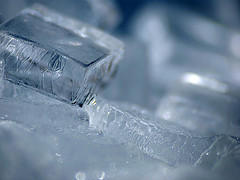Have you ever cracked a couple of cold ice cubes from the tray, plopped them into your glass of iced tea and thought, “Hmm… If ice is solidified water, then why does it float?” This is one topic that stumps many thoughtful people, but the answer is actually quite simple.
The definition of floating is when something has less mass than the liquid that it’s immersed in. This means that the ice cubes would have to be able to push the water out of its way in order to make it to the bottom of the glass, which also means that it would have to be denser than the water. As water freezes, its hydrogen bonds actually make it become less dense, which is unlike any other substance in its frozen state. Because ice is about nine percent less dense than water, it is impossible for it to sink.
If you still have a difficult time understanding this concept, think of a frozen lake in the wintertime: if it didn’t freeze from top to bottom, there would be nowhere for the fish to go!
Why does ice float? [MSU.edu]
Ask a science teacher: What makes ice float? [Fox News]
Why Does Ice Float? [About.com]

![By Fl295 at en.wikipedia (Transferred from en.wikipedia) [Public domain], from Wikimedia Commons](http://blog.respage.com/broadstone-towne-center-apartments/files/2013/10/wpid-4169.jpg)
 Equal Housing Opportunity
Equal Housing Opportunity